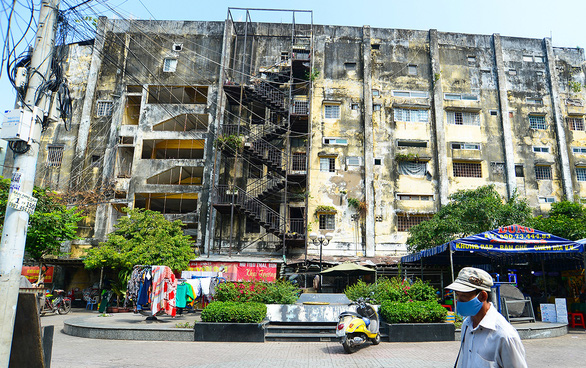The Ho Chi Minh City People’s Committee has submitted a proposal to the Ministry of Construction amending and supplementing a decree which allows for the renovation and reconstruction of old apartment buildings without approval from 100 percent of the residents in the affected tenements.
According to the proposal, the government will be permitted to allow property developers to tear down old apartment buildings in order to build new residential complexes after receiving consent from just 50 percent of the affected owners.
Those who dissent from giving up their property will be forced to relocate in order to facilitate construction.
The proposal was framed as an alternative to current regulations which prohibit the renovation on or reconstruction of old buildings until 100 percent of the affected residents give their approval.
The buildings in question are meant to be those which authorities deem in danger of collapse.
The Truc Giang apartment building in Ward 13, District 4 is a prime example of the ongoing struggle between residents who wish to keep their homes and authorities who claim those homes are too dangerous to inhabit.
Though an assessment by authorities in 2017 noted that the building was heavily degraded, no renovations have been made to Truc Giang as not all residents have not given their consent.
Meanwhile, the District 4 People’s committee believes the building to be in such a state of disrepair that they have relocated 119 Truc Giang households to temporary residences.
Four households, however, have refused to leave the building in order to show their disapproval of the renovation plan.
The Vinh Hoi apartment building in the same district has faced the same problem.
“The ultimate purpose of renovating or demolishing old apartment buildings is to improve the urban area and reorganize people’s lives in a more secure, proper, and stable way,” said Vo Thanh Dung, deputy chairman of District 4.
“The government forcing people to move out of old and dangerous condominiums is not a punitive measure but a drastic action to protect people’s lives and property, and ensure order and security of the locality,” Dung added.
According to an expert from the Ho Chi Minh City Department of Construction, most of the disapproval stems from the failure of private developers and apartment owners to reach a consensus on compensation value or relocation methods.
The Department of Construction also claimed that the longer the negotiations take, the more compensation value is deflated.
As such, the municipal People’s Committee suggested that the government only compensate apartment owners in old buildings by resettling them in new apartments, not by money.
Apartment owners who oppose the relocation will receive only compensation or assistance equal to the average value of the new apartments provided for those who agree to the reconstruction project.
Like us on Facebook or follow us on Twitter to get the latest news about Vietnam!





















































